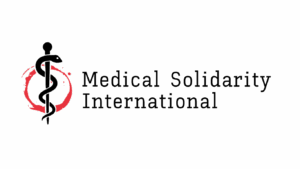Info Campaign 2024
Everyone has access to Medical Care?
… not a bit of it!
Regardless of the country of origin, medical care is a fundamental right for every human being, as enshrined in various human rights treaties. However, the actual access to this right varies significantly from one country to another and depends on specific situations.
In our daily practice, we often experience how access to basic medical care should be guaranteed for everyone, which is far from being the case in reality. Below, we will share examples from our projects in Germany, Greece,
Bulgaria and Bosnia that further illustrate these challenges.
Germany
The German Social Security Code (SGB) V regulates that statutory health insurance must meet medical needs [1]. However, reality shows otherwise: although the legal framework theoretically provides access to necessary medical treatment for everyone, many people – especially the homeless and those without a residence permit – are often denied access to healthcare [2].
Refugees who apply for asylum in Germany have limited access to medical services during the first 18 months of their residence, according to the Asylum Seekers‘ Benefits Act (AsylbLG). During this period, they are provided treatment merely for urgent diseases or pain, pregnancy and birth, as well as vaccinations, as stated in § 4 of the AsylbLG [3].
Treatments of chronic diseases, long-term care needs, and disabilities must be applied for separately at the social office (Sozialamt) and are limited to the most essential healthcare [4].
Additionally, there is significant criticism regarding the limited medical care, especially in the field of psychological care. In 2022, only 3.1% of psychological care needs […] could be met [5].
The numbers in the Psychosocial Supply Report (psychosozialer Versorgungsbericht) of 2024 are significant, according to the German Association of Psychosocial Centres for Refugees and Victims of Torture (BAfF), which shows that ‘87% of refugees in Germany have experienced possibly traumatizing events like war, persecution, or forced recruitment. Around 30% are affected by depression or post-traumatic stress disorder. The extent to which experiences of violence lead to post-traumatic stress disorder strongly depends on the living conditions after fleeing the crisis area’ [6].
This deficiency illustrates the discrepancies between the legal framework and the actual access to healthcare in Germany.
Greece
The right to health is enshrined in Article 21 of the Greek Constitution, through which the state is obliged to secure the health of citizens and ensure proper medical care. Greece has also signed and ratified the UN Social Pact, which includes the obligation to uphold the right to health. Despite this legal framework, there is a significant shortage of capacity and the resources of public health sector, which in turn reduces the provision of health services for all population groups, including refugees.
The Asylum regulation of 2020 aims to speed up and optimize asylum procedures, along with subsequent changes and adjustments to the laws. These laws and regulations include measures such as the introduction of provisional social security and healthcare identification numbers for asylum seekers to legitimize and theoretically regulate access to healthcare. In reality, however, there is restricted access to healthcare for refugees in Greece due to restrictive asylum procedures and political decisions. In particular, the healthcare situation in official Greek camps is insufficient. Alongside state-induced gaps in healthcare provision, such as the suspension of medical care in the camps since July 2024, the overcrowding in the camps is catastrophic [7].
Bulgaria
The situation for people seeking refuge in Bulgaria is deeply concerning, particularly with regard to healthcare. While refugees theoretically have a right to basic medical care, which the Bulgarian government is obligated to pro-vide during the status confirmation process, significant gaps persist. Many non-governmental organizations (NGOs), including ours, regularly encounter severe shortages in medical treatment. Often, healthcare is reduced to the provision of painkillers, with little else offered. This is compounded by a prevailing dismissive attitude toward patients.
During the asylum process, refugees are prohibited from working, leaving them in dire financial difficulties.
Once the asylum procedure is completed, the government withdraws coverage for health insurance costs. Healthcare is then limited exclusively to emergency situations, which is provided only in life-threatening cases.
The overall situation of refugees in Bulgaria is alarming and urgently requires attention and support to ensure their fundamental healthcare needs are met. This assessment aligns with the findings of the Lower Saxony Refugee Council about the conditions of refugees in Bulgaria in September 2024: ‘The minimum standards for humane accommodation conditions, medical care, and safety are not met in Harmanli (refugee camp in Bulgaria)’ [8].
__________________________________
Sources:
[1] Bundesrepublik Deutschland. Sozialgesetzbuch (SGB) Fünftes Buch – Gesetzliche Krankenversicherung (SGB V). 20. Dezember 1988.
[online] https://www.gesetze-im-internet.de/sgb_5/BJNR024820988.html [accessed: 22.09.2024].
[2] taz. Deutsches Gesundheitssystem: Zwei Klassen und kein Ende. Veröffentlicht am 26. Februar 2023. [online] https://taz.de/Deutsches-Gesundheitssystem/!5918575/ [accessed: 22.09.2024].
[3] Bundesrepublik Deutschland. Asylbewerberleistungsgesetz (AsylbLG). [online] https://www.buzer.de/4_AsylbLG.htm [accessed: 22.09.2024].
[4] PRO ASYL. (2023). #GesundheitFürAlle – Schluss mit der diskriminierenden Gesundheitsversorgung von Geflüchteten! [online] https://www.proasyl.de/news/gesundheitfueralle-schluss-mit-der-diskriminierenden-gesundheitsversorgung-von-gefluechteten/ [accessed: 01.10.2024].
[5] BAfF: Flucht und Gewalt. Psychosozialer Versorgungsbericht 2024. [online] https://www.baff-zentren.org/wp-content/uploads/2024/06/BAfF_VB2024_web_01.pdf S. 72 [accessed: 2.10.2024].
[6] BAfF: Flucht und Gewalt. Psychosozialer Versorgungsbericht 2024. [online] https://www.baff-zentren.org/wp-content/uploads/2024/06/BAfF_VB2024_web_01.pdf [accessed: 2.10.24].
[7] Taz. (2023). Geflüchtetencamps in Griechenland: Einblicke in die aktuelle Lage. [online] https://taz.de/Gefluechtetencamps-in-Griechenland/!6022264/ [accessed: 29.09.2024].
[8] Flüchtlingsrat Niedersachsen. (2023). Schrecken und Perspektiven im deutschen Abschiebeland Bulgarien: Erster Bericht von einer Recherchereise. [online] https://www.nds-fluerat.org/60524/aktuelles/schrecken-und-perspektiven-im-deutschen-abschiebeland-bulgarien-erster-bericht-von-einer-recherchereise/ [accessed: 03.10.2024].
Further sources:
Deutsches Ärzteblatt. (2024). Ärzte und Psychotherapeuten kritisieren Einschränkung der Gesundheitsversorgung für Asylbewerber. [online] https://www.aerzteblatt.de/nachrichten/148835/Aerzte-und-Psychotherapeuten-kritisieren-Einschraenkung-der-Gesundheitsversorgung-fuer-Asylbewerber [accessed: 03.10.2024].
Bundesärztekammer. (9. Dezember 2022). Recht auf medizinische Versorgung muss staatlich garantiert werden. [online] https://www.bundesaerztekammer.de/presse/aktuelles/detail/recht-auf-medizinische-versorgung-muss-staatlich-garantiert-werden [accessed: 03.10.2024].
Bulgaria News. (2024). Advocacy Report May & June 2024. [online] https://medical-volunteers.org/AdvocacyReportBulgaria_May-June2024.pdf
Frahm, J. (2024, 21. Juli). Geflüchtetencamps in Griechenland: Hilfe lässt auf sich warten. TAZ Verlags- und Vertriebs GmbH. [online] https://taz.de/Gefluechtetencamps-in-Griechenland/!6022264/ [accessed: 24.09.2024].

